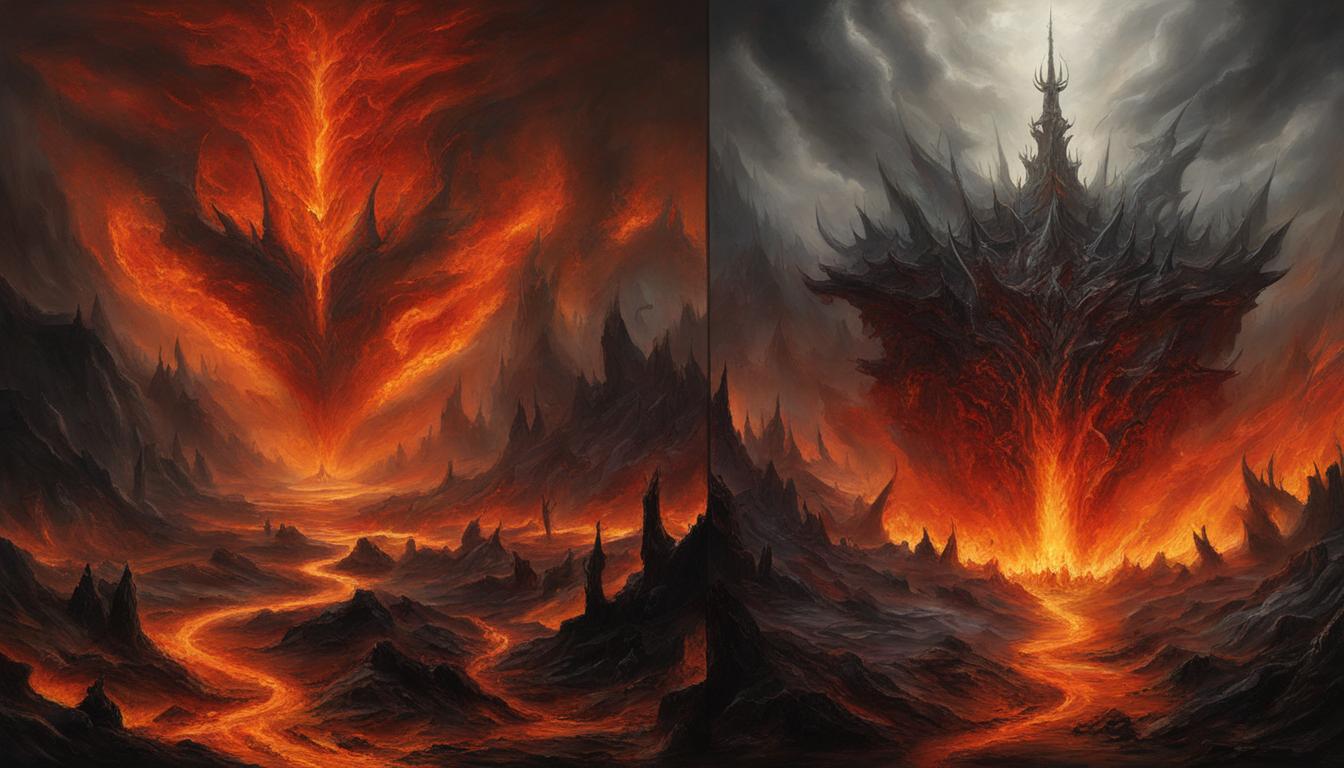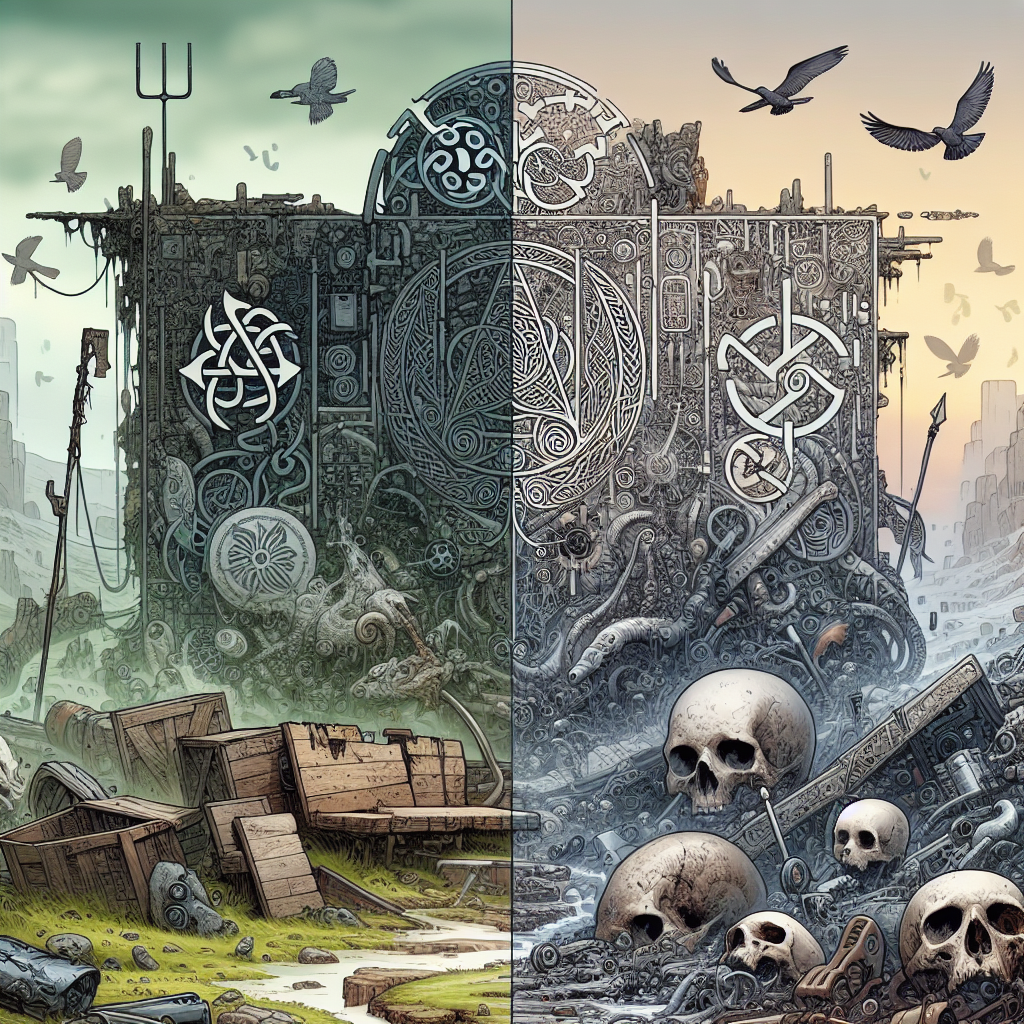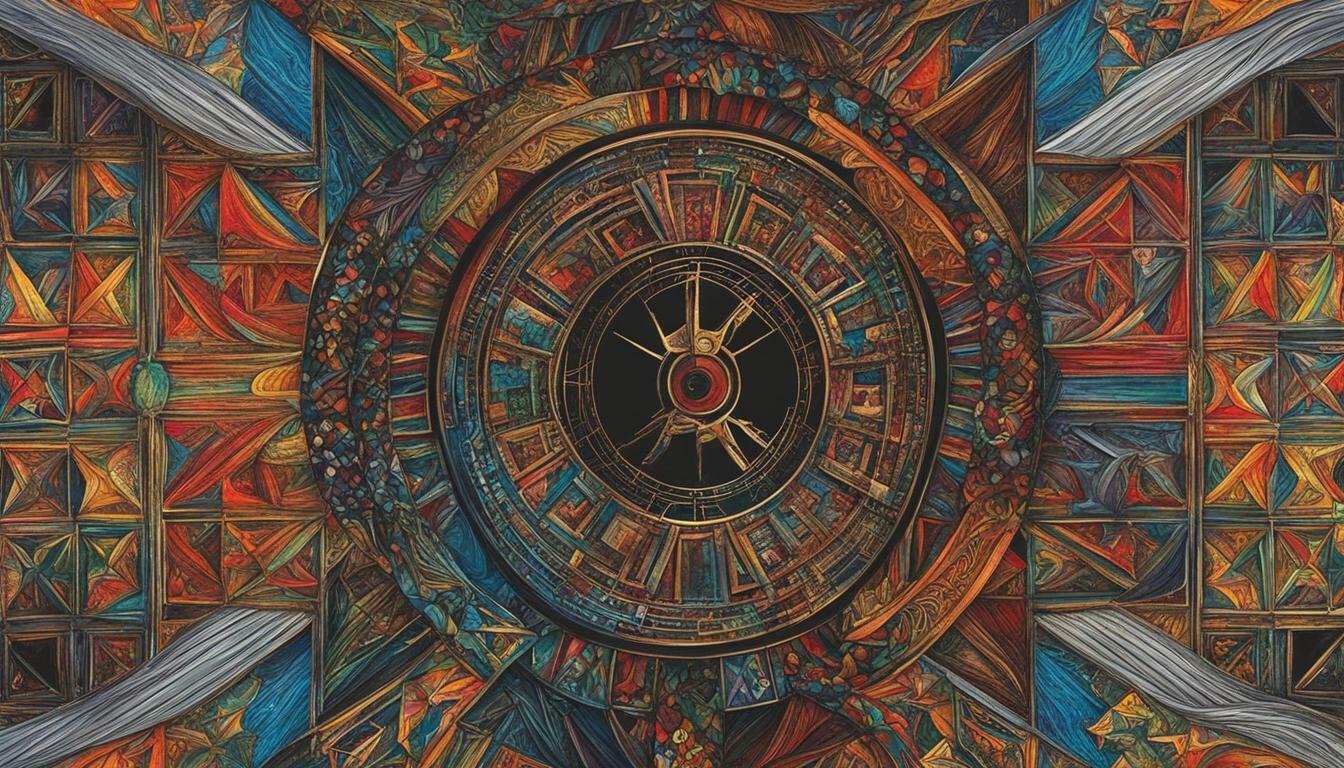Welcome to our article that explores the fascinating contrasts between the Biblical and Quranic descriptions of Hell. In this section, we will delve into the disparities in how Hell is depicted in the Bible and the Quran, and how these variations shape the spiritual perspectives in Christianity and Islam.
Key Takeaways:
- The Christian concept of Hell is eternal and meant for almost everyone, while the Islamic understanding of Hell is not eternal and reserved for the worst of the worst.
- Christianity portrays Hell as an everlasting punishment, emphasizing the importance of salvation and following the teachings of Jesus.
- In contrast, Islam describes Hell as a place of punishment, but not eternal, with the duration of torment being proportional to the evil deeds committed.
- The descriptions of Hell in the Bible and the Quran reflect differing perspectives on mercy, justice, and the possibility of redemption.
- Beliefs about Hell can have a profound impact on faith, spirituality, and religious practices in both Christianity and Islam.
Hell in Christianity
In Christianity, the concept of Hell holds significant theological and spiritual implications. It is often depicted as an everlasting punishment from which one never escapes. The belief in eternal damnation is a core tenet in many Christian denominations, emphasizing the consequences of rejecting salvation and straying from the teachings of Jesus.
Biblical depictions of Hell describe it as a place of suffering, torment, and separation from God. The severity of punishment in Hell serves as a deterrent and reinforces the importance of seeking salvation and adhering to moral and ethical principles. Passages such as Matthew 25:46 illustrate the eternal nature of Hell, referring to it as “eternal punishment” for those who fail to live righteous lives.
| Aspect | Description | |
|---|---|---|
| 1 | Severity | Eternal suffering and torment |
| Consequence | Result of rejecting salvation |
This concept of Hell as an everlasting punishment serves as a motivation for believers to strive for righteousness and spiritual growth. It underscores the importance of living a life in accordance with Christian teachings and seeking forgiveness for sins committed. The fear of eternal damnation and the hope for salvation shapes the faith and spirituality of Christians.
The Concept of Hell in Islam
In Islam, the concept of Hell holds a significant place in religious teachings and serves as a reminder of the consequences of evil deeds and the rejection of faith. The Quran provides vivid and detailed depictions of Hell, portraying it as a place of intense punishment and torment for those who have committed wrongdoing.
The descriptions of Hell in the Quran emphasize the severity of its torment. It is depicted as a blazing fire, fueled by men and stones, where sinners suffer unimaginable pain and anguish. The Quranic verses paint a terrifying picture of Hell, warning individuals of the consequences of their actions and the ultimate fate that awaits them if they do not repent.
Unlike the Christian belief in eternal damnation, Islamic theology holds that Hell is not eternal. The duration of punishment in Hell is believed to be proportional to the sins committed by individuals. This concept of temporary punishment offers hope for redemption and emphasizes the mercy and forgiveness of Allah. The majority of Muslims aspire to reach Heaven, and the teachings of Islam encourage believers to seek forgiveness and strive for righteousness to avoid the torments of Hell.
| Key Points about Hell in Islam |
|---|
| 1. Hell is depicted as a place of intense punishment and torment in Islamic teachings. |
| 2. The Quran describes Hell as a blazing fire, fuelled by men and stones, where sinners suffer unimaginable pain. |
| 3. Unlike the Christian belief in eternal damnation, Islam teaches that Hell is not eternal, and the duration of punishment is in proportion to the sins committed. |
| 4. The concept of temporary punishment in Hell offers hope for redemption and emphasizes the mercy and forgiveness of Allah. |
Descriptions of Hell in the Bible
The Bible provides various descriptions of Hell throughout its books, offering insight into the concept of eternal punishment. In the Old Testament, Hell is often referred to as Sheol, a place of the dead. While the specific details of Hell’s torment are not extensively described, references to a place of darkness and separation from God are prevalent. In the New Testament, the concept of Hell evolves, introducing the idea of punishment and eternal damnation. Passages like Matthew 5:27-30 vividly portray Hell as a place of intense suffering and regret, emphasizing the consequences of sinful actions.
The descriptions of Hell in the Bible serve as a reminder of the consequences of straying from God’s teachings. They highlight the severity of punishment and the need for redemption, emphasizing the importance of leading a righteous life. The imagery used in these descriptions creates a vivid picture of the anguish and torment awaiting those who reject salvation and choose a path of wrongdoing.
| Book | Description of Hell |
|---|---|
| Old Testament | Sheol – a place of darkness and separation from God |
| New Testament | Punishment, eternal damnation, intense suffering and regret |
The descriptions of Hell in the Bible vary in their specific details, but they collectively convey a message of the consequences of sin and the need for righteousness. While the Old Testament focuses more on the place of the dead, the New Testament introduces a more vivid portrayal of Hell as a place of punishment and eternal suffering. These descriptions serve as a warning and reminder of the spiritual consequences that await those who choose to reject God’s teachings and embrace evil.
Overall, the descriptions of Hell in the Bible emphasize the importance of faith, redemption, and living a righteous life. They serve as a moral guide, urging believers to choose the path of righteousness and avoid the eternal consequences of sin. The vivid imagery used in these descriptions acts as a powerful motivator for individuals to seek salvation and live according to the teachings of their faith.
Descriptions of Hell in the Quran
The Quran, the central religious text of Islam, provides vivid descriptions of Hell as a place of punishment for disbelievers and evildoers. These descriptions serve as a warning to followers of Islam to avoid committing sins and to strive for righteousness. Quranic verses such as 2:24, 22:19-22, and 37:62-68 paint a harrowing image of Hell, emphasizing the intense suffering and torment endured by its inhabitants.
In these verses, Hell is portrayed as a blazing fire fueled by men and stones, where sinners eat from the Tree of Zaqqum—a tree with bitter fruit that causes torment. The Quranic descriptions of Hell highlight the severity of its punishment, with intense heat, boiling water, and unimaginable agony awaiting those who rejected faith and committed evil deeds.
These vivid depictions in the Quran serve as a powerful reminder of the consequences of sinful actions and the importance of faith and righteousness. They contribute to shaping the moral values and spiritual perspectives of Muslims, reinforcing the belief in divine justice and the ultimate accountability for one’s actions.
| Description of Hell in the Quran | Verses |
|---|---|
| A blazing fire fueled by men and stones | 2:24 |
| Tree of Zaqqum as tormenting sustenance | 22:19-22 |
| Boiling water and intense suffering | 37:62-68 |
Differences in Severity and Duration of Hell
One of the key differences between the Biblical and Quranic descriptions of Hell is the severity and duration of punishment. In Christianity, Hell is often depicted as an eternal, everlasting torment with no escape, reserved for all who do not follow the teachings of Jesus. This belief in the eternal damnation serves as a deterrent and reinforces the importance of salvation and following the Christian faith. The severity of punishment in Hell is seen as a just consequence for rejecting salvation.
On the other hand, Islam teaches that Hell is not eternal. The duration and intensity of punishment in Islamic Hell are believed to be proportional to the individual’s deeds. The Islamic concept of Hell is that it is reserved for those who rejected faith and committed evil deeds. While the Quran describes Hell as a place of intense suffering and torment, it also allows for the potential of God’s mercy and eventual redemption. This belief in a temporary Hell reflects a different understanding of justice and mercy within Islamic theology.
Overall, the contrasting views on the severity and duration of Hell in Christianity and Islam shape the spiritual perspectives in each faith. The eternal punishment in Christian Hell serves as a motivation to seek salvation and adhere to religious teachings, while the belief in a temporary Hell in Islam offers the possibility of redemption and highlights the mercy of God. These divergent beliefs provide individuals with different theological frameworks to understand the consequences of their actions and strive for spiritual growth.
| Severity | Duration | |
|---|---|---|
| Christianity | Eternal, everlasting torment | Perpetual, with no escape |
| Islam | Intense suffering and torment | Proportional to individual’s deeds, not eternal |
Perspectives on Mercy and Justice
One of the key differences between the Christian and Islamic views of Hell lies in their perspectives on mercy and justice. In Christianity, the concept of Hell represents a just consequence for rejecting salvation and going against the teachings of Jesus. It is seen as an eternal punishment that serves as a deterrent and reinforces the importance of following the path of righteousness. In contrast, Islam offers a more nuanced understanding of Hell, emphasizing that it is not eternal and that the duration of punishment is proportional to the individual’s deeds. This allows for the possibility of God’s mercy and eventual redemption for most individuals.
In the Christian view, Hell acts as a form of divine justice, where sinners receive the punishment they deserve for their rejection of God’s love and salvation. This understanding aligns with the belief in an all-merciful and all-knowing God who metes out appropriate consequences for one’s actions. On the other hand, the Islamic perspective acknowledges the justice of God, but also recognizes the capacity for forgiveness and redemption. While Hell is a place of punishment, it is not meant to be a permanent destination for the majority of individuals. The duration of punishment in Hell is believed to be a means of purifying and purging the soul, with the ultimate goal of attaining entry into Heaven.
Key Differences:
- In Christianity, Hell is eternal and represents a just punishment for rejecting salvation.
- In Islam, Hell is temporary and the duration of punishment is based on an individual’s deeds.
- Christianity emphasizes divine justice and the consequences of rejecting God’s love.
- Islam acknowledges divine justice but also emphasizes the potential for redemption and God’s mercy.
| Christian View | Islamic View | |
|---|---|---|
| Duration of Punishment | Eternal | Temporary, proportional to deeds |
| Concept of Mercy | Justice is seen as a form of mercy | Potential for mercy and redemption |
These contrasting perspectives on mercy and justice shape the spiritual outlooks of Christianity and Islam. While the Christian view of eternal punishment underscores the seriousness of sin and the importance of salvation, the Islamic emphasis on God’s mercy and redemption provides hope for individuals to find forgiveness and ultimately attain entry into Heaven. Understanding and respecting these differing viewpoints can foster greater interfaith dialogue and a deeper appreciation for the richness and diversity of religious beliefs.

Interpretations and Variations within Christianity and Islam
The interpretations and beliefs surrounding the concept of Hell can vary within both Christianity and Islam. Different Christian denominations and Islamic sects may place emphasis on certain aspects of Hell or have varying understandings of its nature, severity, and duration. These variations contribute to the diversity in theological perspectives and foster ongoing discussions and debates among scholars and believers.
In Christianity, interpretations of Hell can differ based on the denomination and the theological framework within which it operates. Some denominations emphasize the literal existence of Hell as a place of eternal punishment for all who do not accept Jesus as their savior. Other denominations take a more metaphorical or symbolic approach, viewing Hell as a representation of the consequences of rejecting God’s love and grace.
Similarly, within Islam, there are variations in the understanding of Hell among different sects and schools of thought. While the Quran provides descriptions and warnings about Hell, the interpretation of these passages can vary. Some scholars emphasize the temporary nature of Hell, believing that eventually, all Muslims will be purified and admitted into Heaven. Others interpret the verses more literally, maintaining a belief in eternal punishment for certain individuals.
| Christianity | Islam | |
|---|---|---|
| Belief in Eternal Hell | Some denominations | Some interpretations |
| Belief in Temporary Hell | Some interpretations | Some sects and interpretations |
| Emphasis on Symbolic Interpretation | Some denominations | Some interpretations |
These variations in interpretations highlight the complexity and depth of religious discourse surrounding the concept of Hell. They provide opportunities for critical thinking, scholarly analysis, and interfaith dialogue, allowing individuals to gain a deeper understanding of their own beliefs and to engage with others’ perspectives in a respectful and meaningful way.
Impact on Faith and Spirituality
Belief in Hell has a significant impact on faith and spirituality in both Christianity and Islam. The concept of Hell serves as a motivation for adherents to follow religious teachings, seek salvation, and live a righteous life. The fear of eternal damnation in Hell or the hope for eventual redemption can shape religious practices, moral values, and spiritual journeys in profound ways.
In Christianity, the belief in an eternal Hell reinforces the importance of accepting Jesus as the savior and living a life of righteousness. It serves as a reminder of the consequences of sin and the need for repentance. The fear of Hell can drive individuals to seek forgiveness, strive for moral purity, and seek spiritual guidance from religious leaders.
In Islam, the belief in a temporary Hell encourages Muslims to live a life of faith and obedience to Allah’s commandments. It serves as a reminder of the consequences of rejecting faith and committing evil deeds. The hope for eventual redemption and reaching Heaven motivates Muslims to perform good deeds, seek forgiveness, and seek spiritual growth.
The Role of Hell in Moral and Spiritual Development
The belief in Hell provides a moral framework for believers in both Christianity and Islam. It encourages individuals to make choices that align with their religious teachings, uphold moral values, and abstain from sinful behavior. The fear of Hell’s punishment and the hope for salvation shape believers’ actions, attitudes, and relationships. Hell is often seen as a deterrent to sinful behavior and a reminder of the importance of leading a virtuous life.
The Paradox of Hell’s Existence
The existence of Hell can create a paradox in the minds of believers. While it serves as a powerful motivator for faith and righteousness, it can also raise questions about the nature of God’s mercy and justice. How can a loving and compassionate God condemn people to eternal punishment? This paradox encourages believers to seek a deeper understanding of their religious teachings and grapple with the complexities of divine justice and mercy.
| Christianity | Islam |
|---|---|
| Belief in eternal damnation in Hell | Belief in temporary punishment in Hell |
| Motivation for seeking forgiveness and salvation | Motivation for living a righteous life and seeking redemption |
| Emphasizes the consequences of sin and the need for repentance | Emphasizes the consequences of rejecting faith and committing evil deeds |
| Can create a sense of fear and guilt | Can create a sense of hope and aspiration |
Understanding and Respectful Dialogue
Engaging in interfaith dialogue regarding the concept of Hell is essential for promoting understanding and fostering mutual respect among individuals of different religious backgrounds. By actively listening and seeking to understand the beliefs and perspectives of others, we can create a space for meaningful conversations that bridge gaps in understanding and bring people closer together.
Interfaith dialogue allows us to explore the different beliefs about Hell in Christianity and Islam, highlighting the nuances and divergences in their interpretations. Through respectful discussions, we can gain insights into the theological concepts behind these beliefs and appreciate the diverse spiritual perspectives that exist. This process of empathy and understanding can help break down stereotypes and misconceptions, promoting a more harmonious coexistence among different religious communities.
By focusing on shared values such as compassion, mercy, and justice, interfaith dialogue can also provide an opportunity to find common ground amidst the differences. Recognizing that the concept of Hell serves different purposes within Christianity and Islam can lead to a deeper appreciation for the underlying principles and teachings that guide believers in each faith.
| Christianity | Islam | |
|---|---|---|
| Duration of Hell | Eternal | Temporary, proportional to deeds |
| Purpose of Hell | Just punishment for rejecting salvation | Punishment and potential for redemption |
| Emphasis on Mercy | Less emphasis | Potential for God’s mercy and eventual salvation |
Through respectful and open dialogue, we can cultivate an environment of learning and growth where individuals can deepen their understanding of different beliefs about Hell. This understanding can ultimately contribute to a more inclusive and tolerant society, where diverse religious perspectives are respected and valued.
Conclusion
The comparison of Biblical and Quranic descriptions of Hell reveals significant differences between the two religions. In Christianity, Hell is portrayed as an eternal punishment reserved for all who reject salvation, emphasizing the severity of suffering and the importance of following the teachings of Jesus. Conversely, Islam presents Hell as a temporary punishment, where the intensity and duration of torment are determined by an individual’s deeds. The majority of Muslims ultimately aspire to attain salvation in Heaven.
These contrasting perspectives on Hell shape the spiritual outlooks of Christianity and Islam, with implications for faith and spirituality. The belief in Hell serves as a motivation to adhere to religious teachings, seek salvation, and live a righteous life. While the Christian concept of eternal damnation reinforces the importance of justice and the consequences of rejecting salvation, the Islamic belief in a temporary Hell allows for the possibility of God’s mercy and eventual redemption.
Recognizing and respecting these differences is vital for fostering interfaith dialogue and understanding. Open and respectful discussions about these beliefs can promote mutual learning, empathy, and a deeper appreciation for the diversity of religious perspectives. By understanding and appreciating the discrepancies in Hell’s descriptions, individuals of different religious backgrounds can engage in meaningful conversations and develop a greater respect for one another’s faith traditions.
FAQ
How do the descriptions of Hell in the Bible and the Quran differ?
The Biblical and Quranic descriptions of Hell differ in several key aspects. Christianity portrays Hell as eternal, while Islam teaches that it is not eternal. Additionally, the severity and duration of punishment in Hell vary between the two religions.
What is the concept of Hell in Christianity?
In Christianity, Hell is often depicted as an everlasting punishment from which one never escapes. It is described as a place of suffering, torment, and separation from God. The severity of punishment in Hell reinforces the importance of salvation and following the teachings of Jesus.
What is the concept of Hell in Islam?
In Islam, Hell is described as a place of punishment for those who rejected faith and committed evil deeds. It is portrayed as a blazing fire, fueled by men and stones, and emphasizes the severity of its torment. However, Islamic theology holds that Hell is not eternal.
How does the Bible describe Hell?
The Bible provides various descriptions of Hell throughout its books. In the Old Testament, Hell is often referred to as Sheol, a place of the dead. The New Testament introduces concepts of punishment and eternal damnation in Hell, where sinners suffer in fire and darkness.
How does the Quran describe Hell?
The Quran contains numerous warnings and descriptions of Hell as a punishment for disbelievers and evildoers. It emphasizes the intensity of suffering and the unbearable torment endured by its inhabitants. Verses provide vivid imagery of Hell as a blazing fire and a place of boiling water.
What are the differences in severity and duration of punishment in Hell?
Christianity portrays Hell as an eternal, everlasting torment with no escape, reserved for all who do not follow the teachings of Jesus. Islam teaches that the intensity and duration of punishment in Hell depend on the individual’s deeds, with the majority ultimately attaining salvation.
How do Christianity and Islam view mercy and justice in relation to Hell?
The eternal punishment in Christian Hell is seen as a just consequence for rejecting salvation. Islam’s belief in a temporary Hell allows for the possibility of God’s mercy and eventual redemption for most individuals.
Are there variations in the interpretations of Hell within Christianity and Islam?
Yes, different Christian denominations and Islamic sects may emphasize certain aspects of Hell differently or have varying understandings of its nature and duration. However, the core concepts of eternal punishment in Christian Hell and temporary punishment in Islamic Hell remain consistent.
How does belief in Hell impact faith and spirituality in Christianity and Islam?
Belief in Hell serves as a motivation to adhere to religious teachings, seek salvation, and live a righteous life. The fear of eternal damnation or the hope for eventual redemption can shape religious practices, moral values, and spiritual journeys in profound ways.
Why is understanding and respectful dialogue about Hell important?
Recognizing and respecting the differences in the descriptions of Hell in Christianity and Islam is crucial for fostering interfaith dialogue and understanding. Encouraging open and respectful discussions about these beliefs promotes mutual learning, empathy, and a deeper appreciation for the richness and diversity of religious perspectives.
What are the key takeaways from the comparative study of Hell in Christianity and Islam?
The differences between the Biblical and Quranic descriptions of Hell reflect distinct theological perspectives in Christianity and Islam. Understanding and appreciating these differences can foster greater respect and dialogue among individuals of different religious backgrounds.
 Skip to main content
Skip to main content


